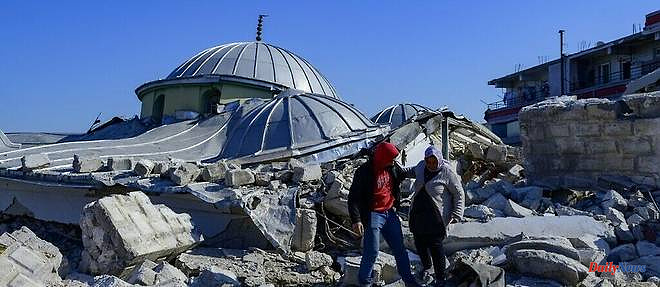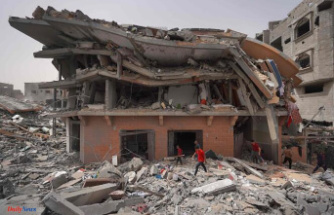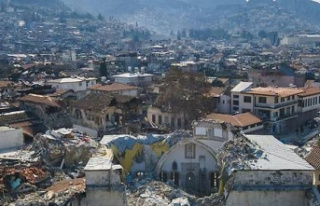The death toll from the violent earthquake that struck Turkey and Syria a week ago rose to 35,225 on Monday, February 13, according to the latest official reports. The 7.8 magnitude earthquake killed 31,643 people in southern Turkey, Afad, Turkey's public disaster management body, said on Monday, while authorities counted 3,581 dead in Syria. The UN said on Sunday that the death toll could "double" again.
During the night from Sunday to Monday, seven people were rescued alive, according to the Turkish press, including a 3-year-old child in Kahramanmaras and a 60-year-old woman in Besni. A 40-year-old woman was also rescued after 170 hours in Gaziantep. A member of a British rescue team posted a video on Twitter on Sunday showing a rescuer going through a tunnel created in the ruins of the same city and pulling out a Turk, stranded for five days.
And in the southern town of Kahramanmaras, near the epicenter of the earthquake, excavators dug and excavated the ruins, while victims, huddled around a fire, awaited news of their loved ones. A total of 34,717 people are currently searching for survivors, Turkish Vice President Fuat Oktay told local media. Some 1.2 million people have been housed in student residences and 400,000 evacuated from the area, he added.
The powerful earthquake also reduced important places of worship to dust. In Antakya, Havva Pamukcu, a Muslim devotee of the Habib-I Nejjar mosque, cannot believe it. "This place means a lot to us," she breathes. “He was very precious to all of us, Turks and Muslims. People used to come here before going on pilgrimage to Mecca,” he said.
The town's Orthodox church suffered the same fate, says Sertac Paul Bozkurt, council member. “Unfortunately, our church was destroyed after the earthquake. All its walls have collapsed and it is in no condition to house prayers,” he laments. “We suffered great losses. We lost around 30-35 people from our religious community,” he said.
The situation is particularly complex in Syria, where Bab-al Hawa, in the northwest, remains the only operational crossing point from Turkey to the rebel areas, also devastated by the earthquake. Trucks, with on board enough to make emergency shelters using plastic sheeting, as well as blankets, mattresses, ropes or even screws and nails, crossed the border. Insufficient aid, admitted the UN.
"Until now, we have failed the people of northwestern Syria," acknowledged the head of the UN humanitarian agency Martin Griffiths. "They rightly feel abandoned" and this failure needs to be "corrected as soon as possible".
The head of the World Health Organization (WHO) Tedros Adhanom Ghebreyesus met Syrian President Bashar al-Assad on Sunday in Damascus, assuring that the latter had shown himself ready to consider the opening of new crossing points to transport aid to rebel areas.
He said he "is open to considering cross-border access points for this emergency," Tedros Adhanom Ghebreyesus told reporters. "The cumulative crises of conflict, Covid, cholera, economic decline and now the earthquake have wreaked unbearable havoc," he also noted during a press conference call.
Bashar al-Assad also thanked the United Arab Emirates for their "enormous humanitarian aid" on Sunday, when he received the head of Emirati diplomacy Abdullah bin Zayed al-Nahyan in Damascus. According to an official from the Syrian Ministry of Transport Suleiman Khalil, 62 planes loaded with aid have so far landed in the country and more are expected in the hours and days to come, including from Saudi Arabia.
The powerful Lebanese movement Hezbollah, an ally of the Syrian government, for its part sent a convoy to western Syria on Sunday, with "food" and "medical supplies".












